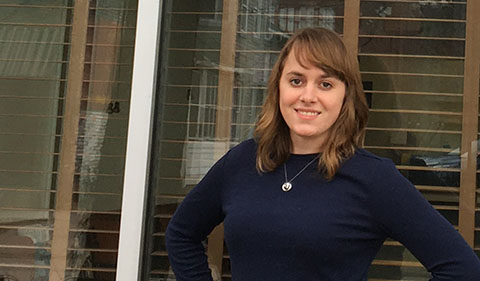
Hannah Vaughn outside Neighborhood Family Practice
Last year Hannah Vaughn ’15 was placed with Neighborhood Family Practice while serving in AmeriCorps. As her service term came to an end, she was approached by senior management about staying with the organization in a new role.
- Meet Vaughn on the Anthropology Career and Networking Alumni Panel, 3 to 3:50 p.m. on Friday, Feb. 3, in Baker 230 – part of the College of Arts & Sciences Career and Networking Week.
- Connect with her on LinkedIn.
Data Management Skills
Through a few conversations it was decided that she would be a good fit for their Quality Improvement department, in part because of the data management skills she gained through her work on the Appalachian Population History Project with Dr. Nancy Tatarek while completing her degree in Anthropology and Spanish with a Certificate in Geographic Information Sciences in the College of Arts & Sciences at Ohio University.
She accepted the role of Quality Improvement Analyst because she had come to really love the organization and its mission.
Her new role is very different from her previous AmeriCorps role as a Refugee Patient Advocate.
Now Vaughn manages the organization’s incentive programs they have with Medicaid insurance payers. These programs give their operation more money beyond a visit fee as their patients’ health improves. Working with these programs involves a lot of population health management and data analysis.
“As I work with the data I look for disparities in our care and then work with other members of the Quality Improvement department to close those gaps,” she says.
Continual Learning and Research
Vaughn loves love that she continues to learn and engage in research for this job. And one of the things she enjoys the most is constantly working on a new project.
“In just a few months I’ve worked on our patient satisfaction survey,” she says, “getting our practice accreditation as a Patient Centered Medical Home, our security risk assessment based on HIPAA guidelines and a campaign to improve our practice’s rates for cervical cancer screenings.”
The Challenge of Changing Roles
One of the biggest challenges she has had in the past year was transitioning between two very different roles.
“I went from a role that was relatively informal and fast-paced to a role that requires a much higher level of formality and allows me to have more choice in what I work on each day,” Vaughn says. “It was something I really struggled with at first. Beyond the culture shock of the new environment, I often felt like I was coming into the middle of the conversation for a lot of projects. This was new for me since the first two jobs I had after graduation were brand new or restructured roles that started at the same time as the projects I had worked on.”
This new role in Quality Improvement required a really steep learning curve for her and she had only recently begun to feel confident in her previous role. A friend pointed out that while Vaughn may be coming into the middle of the conversation, it also means that she has the opportunity to provide a fresh perspective for her colleagues.



















Comments